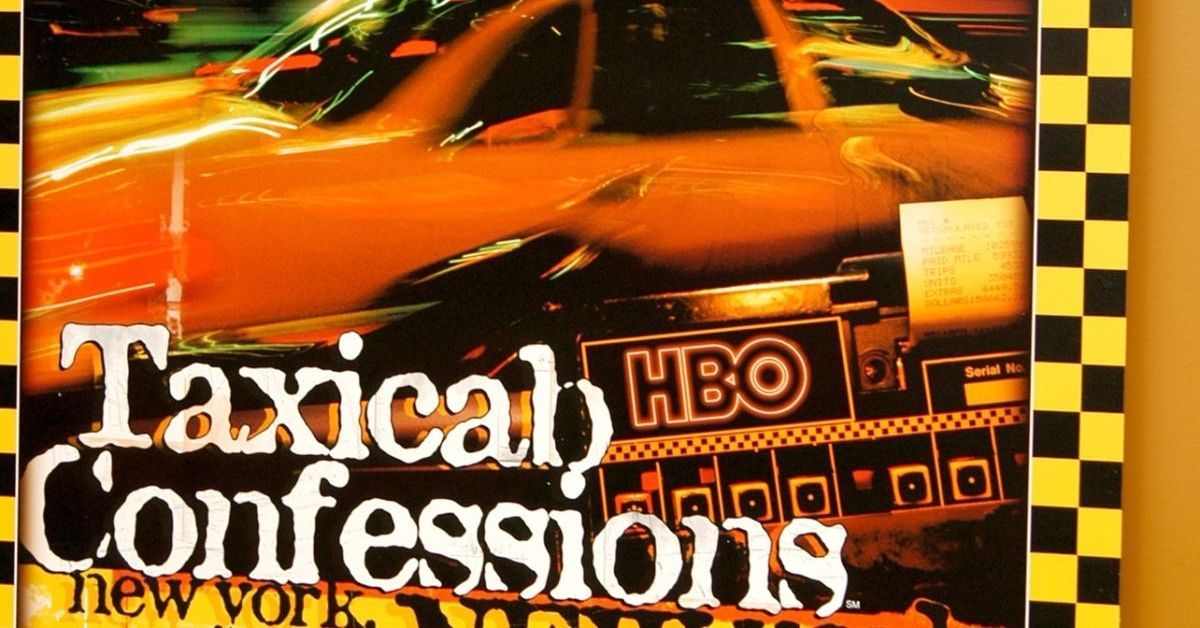Long before the cast of Jersey Shore were going wild on the East Coast and the Real Housewives were constantly bickering in every corner, nook and cranny in America, a simpler reality show took the world by storm. Or, at least, it captivated those subscribing to HBO prior to the success of The Sopranos, The Wire, Game of Thrones, Succession, and Euphoria. Harry and Joe Gantz's Taxicab Confessions may have been short-lived, but it's left an unparalleled mark on the TV industry, particularly when it comes to the reality genre. Not only was it HBO's first foray into the reality genre, it was also one of America's first reality shows.
The hidden-camera show paved the way for the confession-based reality TV we see today. In fact, it even helped create a reality show category at the Emmy's. When the show won an Emmy in 1995, it was competing in the "Outstanding Informational Special" category. In a sense, it was an 'informational' show. After all, it revealed much about the dark, controversial, and even erotic lives of New York's (and eventually Las Vegas') taxi users... without them knowing, of course. At the time, it was doing what no other show was doing. And it did it in just 19 episodes spread out between 1995 and 2006. Like all good television, the origin for Taxicab Confessions came from reality...
The Creators Of Taxicab Confessions Got The Idea While Actually Driving A Cab
In an interview with MEL Magazine about the complicated run of the HBO series, co-creator and executive producer Joe Gantz explained that he got the idea for Taxicab Confessions while actually driving a cab in Wisconsin while he was at university. After "people watching" those sitting in the backseat, he decided to record the conversations.
"The strangers in the back would have conversations with each other, and it would get really interesting," Joe Gantz explained in the fascinating interview with MEL Magazine. "So I got a tape recorder and recorded them from the front seat. I didn’t ask them questions, but I was interested in what people were talking to each other about, how they were explaining themselves and what motivated them. If two people were in an interesting conversation, I wouldn’t want to interrupt by picking up another person, so I ended up making less money."
Joe and his brother both had been interested in the film industry and even produced a pilot at one point called A Life At Random. In it, the brothers would interview strangers in random cities across America. But with Joe's discovery in the front seat of the taxi, the two knew they had something special. At the time, their only real competition was The Jerry Springer Show which the brothers believed was staged. Whether all the fights on The Jerry Springer Show were staged or not was beside the point. The Gantz brothers believed it was exploitive, especially of minorities and dispossessed people. Much like Jerry Springer's show, however, the Gantz brothers believed Taxicab Confessions was a talk show... but one where the guests were allowed to take control and say anything. It was real and basically unedited.
Because of the pilot they produced, the Gantz brothers were asked to take a meeting at Warner Telepictures by producer Hilary Estey.
"[Hilary] showed us a video they had presented for a show about a vigilante cab driver who fashioned himself after Travis Bickle [from Taxi Driver]. He went around armed during the L.A. Riots, confronting looters, acting like he was saving people, and basically making an ass of himself," Harry Gantz said. "She asked if we’d be interested in doing a show like that. And since you never say no, we went home and mashed up what they’d shown us with A Life at Random. But instead of making it about the cab driver, we focused on the passengers and presented a pitch for Taxicab Confessions. They gave us small amount of money to do a sizzle reel: four rides shot on concealed Hi8 camcorders. We shot rides in both the day and night and found people to be much more willing to open up and let their feelings come out at night. There’s something about the darkness that makes people look at themselves on a deeper level. We pitched it to all the networks, but HBO is the one that bought it."
How HBO Made Taxicab Confessions Into A Much More Adult Show
While Sheila Nevins, the former Preside of HBO Documentary Films, liked the pitch for Taxicab Confessions, she thought it was s a bit tame for the type of network they were trying to make HBO into.
"It was boring to me to pick up babysitters, kids coming home from school and people leaving work," Sheila explained. "I thought it had R-rated potential. And it did. The New York City taxicab was a beloved, egalitarian vehicle to get from point A to point B. Like the American dream on wheels. There’s nothing quite like it today: Trains have silent cars; planes have classes; and poor people aren’t really welcome on either. And the variety! You didn’t know who was gonna hail that cab. Imagine how exciting that job would be. You and I go to work and know pretty much everybody. We go to a restaurant and pretty much know who the waiters and clientele will be. But this was always surprising and exciting. That was the fun of it."
"I consider Taxicab to be the precursor to reality television," Sheila continued. "It was its own thing, unlike anything that had ever been on TV. The only show before that featured real people was Candid Camera. Taxicab proved that real people could be incredibly engaging, enticing, sexual, outrageous, fanciful and different. Along with HBO shows like Real Sex and G String Divas, Taxicab birthed the interest in docu-style reality shows."

